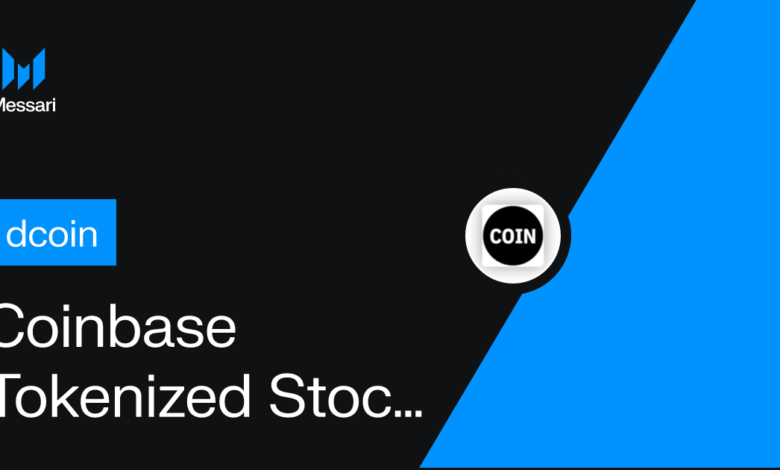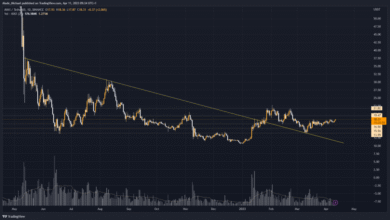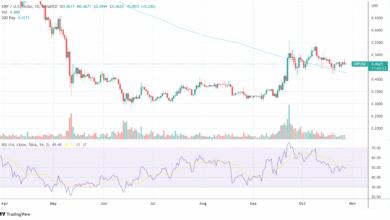Tokenized Coinbase Stock: Backed Finance Expands Offerings

Tokenized Coinbase stock is making waves in the financial realm, thanks to Backed Finance’s innovative approach. This new offering allows crypto investors to directly own a piece of one of the largest publicly listed companies in the cryptocurrency sector, bridging the gap between traditional finance and the decentralized world of DeFi. By launching its tokenized version of Coinbase stock (bCOIN) alongside an S&P 500 token on the Avalanche C-Chain, Backed Finance is redefining accessibility in investing. With this breakthrough, individuals can dive into securities trading without the complexities of a bank account or traditional portfolio establishment. As interest in real-world assets grows, the potential for enhanced financial inclusion and diversification in crypto investing also expands, paving the way for a new wave of investment opportunities.
The emergence of digitized shares, particularly in the form of tokenized Coinbase stock, signifies a pivotal shift in how we perceive and engage with financial assets. Additionally, platforms like Backed Finance are not just limiting themselves to cryptocurrencies but are also exploring real-world assets to enhance the investment landscape further. By connecting investors to instruments that mirror the S&P 500 index through the Avalanche C-Chain, they are facilitating a seamless transition from traditional to digital finance. This integration opens new doors for those seeking participation in equity markets without the barriers typically associated with stock trading. As crypto staking and liquidity provision become increasingly popular, the potential for enhanced returns in a digitized economy becomes remarkable.
The Rise of Tokenized Assets in Crypto Investing
Tokenized assets are revolutionizing the financial landscape by bridging the gap between traditional finance and decentralized finance (DeFi). With platforms like Backed Finance introducing tokenized versions of established equities, investors now have the opportunity to engage in crypto investing with more confidence and accessibility. This innovation allows for fractional ownership of assets, enabling a broader demographic of individuals to invest in high-value securities that were previously beyond their reach. Furthermore, the integration of real-world assets into blockchain technology has paved the way for enhanced liquidity and operational efficiency, marking a significant shift in how financial products are distributed and traded.
As the crypto market continues to evolve, the introduction of tokenized securities like the tokenized Coinbase stock (bCOIN) stands as a testament to the increasing interconnectivity of digital currencies with traditional assets. Automated trading strategies and smart contracts empower users to engage in real-time trading without the intermediaries typically required in traditional markets. This shift not only democratizes access to wealth generation but also presents a lucrative avenue for crypto investors to benefit from enduring assets such as those found in the S&P 500. Thus, the rise of tokenized assets can be viewed as a pivotal development in creating a decentralized financial ecosystem.
Introducing the bCOIN: Benefits of Tokenized Coinbase Stock
The tokenized Coinbase stock, known as bCOIN, represents a significant advancement in the expansion of product offerings by Backed Finance. This token aims to provide investors with an easy and seamless way to gain exposure to one of the largest publicly traded companies in the crypto industry without the traditional barriers that accompany stock investments. By utilizing blockchain technology on the Avalanche C-Chain, bCOIN offers features such as instant transactions and transparency, further enhancing user confidence in these new investment avenues.
Investors stand to benefit considerably from holding bCOIN, as it not only allows exposure to Coinbase’s stock but also incorporates the advantages of liquidity pools on platforms like PharaohExchange. With the ability to generate yield from liquidity provision, bCOIN holders can enhance their investment portfolio while still enjoying the potential price appreciation of the underlying asset. The entertainment of real-world assets into the crypto space ensures that backers of bCOIN contribute to a growing market that highly values transparency, efficiency, and accessibility.
The Integration of Real World Assets in Decentralized Finance
Real World Assets (RWAs) present a unique intersection of the traditional financial sector and the burgeoning world of decentralized finance (DeFi). By enabling assets such as real estate, commodities, and equities to be represented on the blockchain, RWAs elevate the potential for financial inclusion globally. Individuals who previously lacked access to basic financial products can now engage in investment opportunities through mobile applications and crypto wallets. This development highlights the ongoing commitment of platforms like Backed Finance to democratize finance and provide innovative solutions to a vast audience.
Moreover, the incorporation of RWAs into the DeFi ecosystem improves transparency and operational efficiencies, fundamentally altering the investment landscape. Since RWAs are represented on the blockchain, asset ownership and transaction history become immutable and can be verified without third-party intervention. This not only minimizes fraud risks but also streamlines processes for investors seeking higher returns on their investments. As a result, and with the emergence of robust solutions like tokenized stock and S&P 500 replicas, we are witnessing a transformative shift that empowers individuals and promotes inclusivity.
Liquidity and Yield Generation on PharaohExchange
PharaohExchange has emerged as a leader in the decentralized exchange market on the Avalanche C-Chain, showcasing a Total Value Locked of 36 million US dollars. This DEX provides an innovative platform for crypto investors to engage seamlessly in liquidity provision, allowing users to earn yield on their investments while ensuring liquidity for tokenized securities like bCOIN. The structure of such exchanges enables users to trade and invest in digitalized versions of assets with a level of efficiency that traditional markets cannot match.
The opportunity for yield generation through liquidity pools also lowers the barriers to entry for novice investors in the crypto space. By engaging with PharaohExchange, users not only invest in assets but also contribute to the liquidity that facilitates market functions, resulting in a symbiotic relationship that enhances the overall ecosystem. As the demand for real-world assets continues to grow, platforms like PharaohExchange will remain integral in shaping the future landscape of decentralized finance.
Exploring the Potential of S&P 500 Tokenization
Tokenizing the S&P 500 index reflects a significant opportunity for investors to gain exposure to a diverse range of top-performing companies without the need for traditional stock market participation. By leveraging blockchain technology, Backed Finance’s S&P 500 token enables instant trades, greater accessibility, and underlines the importance of inclusivity in the investment landscape. This disruptive approach allows crypto investors to build a balanced portfolio while enjoying the benefits of investing in established market stalwarts.
Furthermore, the advent of S&P 500 tokenization serves as a testament to the effectiveness and desirability of incorporating traditional assets in decentralized finance. As users gain access to a familiar index through tokenized securities, they are more likely to explore the broader ranges of investment opportunities presented by blockchain innovations. This encourages a mindset shift among investors toward embracing digital assets and integrating them into their investment strategies, showcasing the vast potential intrinsic to the fusion of traditional equity with DeFi.
The Role of the Avalanche C-Chain in Financial Innovation
The Avalanche C-Chain is quickly positioning itself as a prominent platform for DeFi applications and innovations, providing scalability, security, and efficiency crucial for the successful implementation of tokenized assets. Backed Finance’s initiatives, such as the tokenized Coinbase stock and S&P 500 token, highlight how the Avalanche C-Chain is becoming a vital infrastructure in enabling these next-generation financial products. The platform’s protocol allows for rapid transactions and seamless reward distribution, meeting the growing demands of contemporary crypto investors.
Furthermore, the flexibility of the Avalanche C-Chain supports multiple use cases in the ever-evolving DeFi landscape. Its compatibility with Ethereum-based assets enhances interconnectivity, enabling projects such as Backed Finance to offer novel financial products that elevate the user experience. As this technology progresses, it promises not only increased efficiency in asset management but also opportunities for innovative financial solutions that align with the evolving needs of a global audience.
Accessible Financial Products Through Mobile Applications
In the modern world, the proliferation of smartphones has made financial management more accessible than ever before. With intuitive crypto apps allowing users to manage their investments on-the-go, Backed Finance is tapping into the everyday experience of individuals to bring decentralized finance to the masses. This level of accessibility is fundamental as it diminishes the traditional barriers posed by the complexity and operational requirements of conventional investing.
As more individuals turn to mobile applications for portfolio management, it becomes essential that financial products offered are tailored to fit this new lifestyle. With options like bCOIN or tokenized S&P 500 indices available on these apps, users find it easier to diversify and manage their portfolios effectively. This shift toward digital management aligns with the growing trend of financial inclusion, demonstrating how innovative platforms can harmonize the advantages of traditional markets with the flexibility of decentralized solutions.
Challenges and Opportunities in DeFi Investment
While the rise of DeFi has ushered in unprecedented opportunities for crypto investors, it also presents challenges that must be navigated carefully. Issues such as regulatory uncertainty and security risks pose significant barriers to broader adoption of tokenized assets. Investors must conduct thorough research and maintain awareness of the evolving regulatory landscape as it pertains to real-world assets to ensure they are making informed decisions in this dynamic environment.
Nonetheless, the opportunities presented in the DeFi space are significant. With projects like Backed Finance leading the charge towards tokenizing real-world assets, there is potential for tremendous innovation that could reshape the financial landscape. Investors who are able to adapt and leverage the unique advantages of DeFi, such as enhanced liquidity and new financial instruments, stand to benefit immensely from this evolving financial paradigm.
Future Prospects of Tokenization in Finance
The future of tokenization in finance appears bright, with increasing interest from both retail and institutional investors in exploring decentralized methodologies. As solutions like the tokenized Coinbase stock and S&P 500 tokens become more widespread, the potential for reshaping traditional investment structures becomes apparent. The ongoing advancements in technology will likely spur further innovations, facilitating the creation of new asset classes and investment strategies.
Moreover, as financial education increases and more individuals become familiar with the concept of tokenized assets, we may witness a shift in attitudes towards investing. Educational initiatives and accessible platforms will play vital roles in guiding the next wave of cryptocurrency enthusiasts towards embracing decentralized finance. The prospects of integrating tokenization within the broader financial ecosystem signal a transformative era, where traditional and digital finance converge to create a more inclusive and efficient marketplace.
Frequently Asked Questions
What is tokenized Coinbase stock (bCOIN) and how does it work?
Tokenized Coinbase stock, known as bCOIN, is a digital representation of equity in Coinbase that allows crypto investors to trade and invest in this prominent company without the traditional barriers of stock trading. By leveraging blockchain technology, specifically on the Avalanche C-Chain, bCOIN offers a seamless way to access the performance of Coinbase stock and participate in the growing field of crypto investing.
How does Backed Finance facilitate investing in tokenized Coinbase stock?
Backed Finance enables users to invest in tokenized Coinbase stock by offering an easy-to-use platform that eliminates the need for bank accounts or traditional stock portfolios. By utilizing real world assets on the blockchain, users can access bCOIN directly through their crypto wallets, making crypto investing more inclusive and efficient.
What are the advantages of using tokenized assets like bCOIN over traditional stocks?
Tokenized assets like bCOIN provide several advantages including lower fees, instant access to investment opportunities without the need for banks, and increased liquidity through platforms like PharaohExchange. Additionally, being built on the Avalanche C-Chain enhances transaction speed and transparency, benefiting crypto investors.
Can I generate yield from my investment in tokenized Coinbase stock?
Yes, by providing liquidity to PharaohExchange, users can generate additional yield from their investments in tokenized Coinbase stock (bCOIN). The decentralized exchange’s Total Value Locked of 36 million USD indicates robust participation, allowing investors to earn returns while holding their tokenized assets.
How does tokenized Coinbase stock relate to the S&P 500 token?
Tokenized Coinbase stock (bCOIN) is part of a broader initiative by Backed Finance which also includes a token replicating the S&P 500 index. Both products allow crypto investors to diversify their portfolios by gaining exposure to well-known indices and companies, thus bridging the gap between traditional finance and DeFi through real world assets.
What role does the Avalanche C-Chain play in trading tokenized Coinbase stock?
The Avalanche C-Chain plays a crucial role in trading tokenized Coinbase stock (bCOIN) by providing a fast, secure, and scalable environment for transactions. This blockchain’s efficiency supports seamless trading and interaction with decentralized finance platforms, enhancing the overall experience for crypto investors.
How does Backed Finance’s tokenization of Coinbase stock enhance financial inclusion?
By offering tokenized Coinbase stock, Backed Finance enhances financial inclusion by allowing access to investment opportunities for individuals who might not have traditional banking facilities. This democratizes investing, ensuring that more people worldwide can invest in popular assets like Coinbase stock through their smartphones or crypto wallets.
| Key Point | Details |
|---|---|
| Backed Finance Expansion | Backed Finance is expanding its product portfolio with a tokenized version of Coinbase stock (bCOIN) and a token replicating the S&P 500 index. |
| Platform Use | Both tokens will launch on the Avalanche C-Chain. |
| Access to Capital Markets | Allows crypto investors to invest in securities without needing traditional bank accounts or stock portfolios. |
| Liquidity Provision | Users can earn extra yield by providing liquidity to PharaohExchange. |
| Market Potential | Connects traditional finance with DeFi, improving financial inclusion for those without access to financial products. |
| Blockchain Efficiency | Real World Assets (RWAs) use blockchain for transparency and efficiency in representing real assets. |
| Coinbase Interest | Coinbase is also looking into creating a tokenized version of its stock. |
Summary
Tokenized Coinbase stock is an innovative financial product that allows investors to access and invest in a well-known company in the cryptocurrency sector without traditional barriers. With Backed Finance’s recent launch of bCOIN and a token replicating the S&P 500 index on the Avalanche C-Chain, the world of DeFi is becoming increasingly interconnected with traditional finance. This initiative not only enhances investor accessibility but also serves as a critical step towards financial inclusion globally. By leveraging blockchain technology, Backed Finance illustrates the potential of Real World Assets and paves the way for a more open financial ecosystem.



